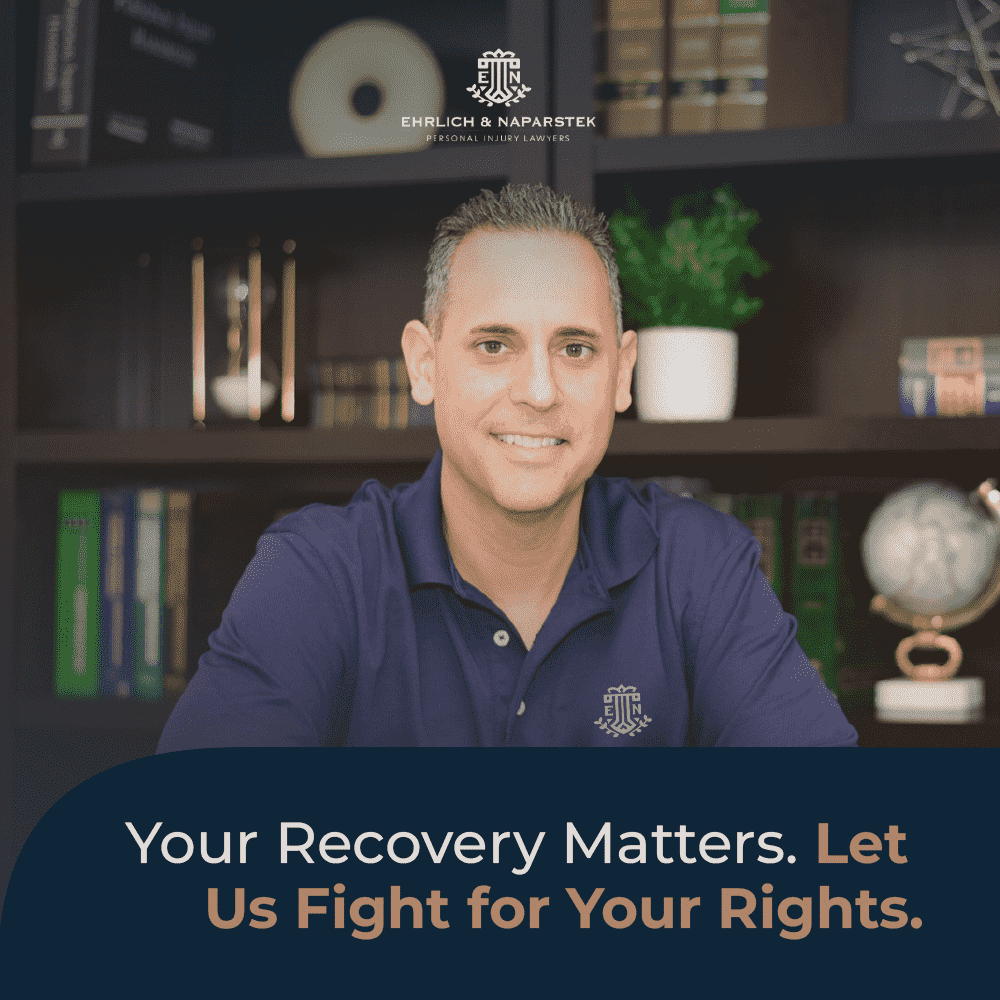Mon to Sun - 24/7 365

Brain injuries are profoundly complex medical conditions that carry the potential for significant, long-lasting impacts on an individual’s life. In Stuart, Florida, where the community is closely knit, the repercussions of brain injuries extend beyond the individuals directly affected, touching families and communities at large. At Ehrlich & Naparstek Personal Injury Lawyers, we recognize the critical nature of understanding both the diagnostic and prognostic paths of brain injuries. Our expertise not only lies in legal representation but also in ensuring that affected individuals and their families are well-informed about these medical processes. This article delves deeper into the intricacies of brain injury diagnosis and prognosis, highlighting the importance of specialized legal support in these challenging situations.
Detailed Diagnostic Process for Brain Injuries in Stuart
The journey towards diagnosing a brain injury is intricate and demands a high level of medical expertise. In Stuart, this process begins with an immediate and comprehensive evaluation following any incident that could lead to a brain injury, such as traffic collisions, falls, or sports accidents.
Initial Assessment: Health care providers first perform a critical initial assessment using the Glasgow Coma Scale (GCS) to evaluate consciousness level and neurological functioning. This assessment is crucial for determining the severity of the injury and guiding the next steps in the diagnostic process.
Advanced Neuroimaging Techniques: Following the initial assessment, patients often undergo advanced neuroimaging tests. CT scans are typically the first line of imaging used due to their efficiency in detecting fractures and hemorrhages. MRIs offer a more detailed view, particularly useful for diagnosing diffuse axonal injury, a common type of injury in severe TBIs. PET scans, although less commonly used, can provide insights into the brain’s metabolic processes, offering valuable information about the brain’s functional status.
Neuropsychological Testing: Beyond imaging, neuropsychological tests play a critical role in understanding the cognitive and emotional impact of brain injuries. These assessments help identify specific areas of cognitive difficulty, such as memory, attention, and problem-solving skills, thereby guiding rehabilitation efforts.
Understanding Prognosis and the Path to Recovery
The prognosis of a brain injury is influenced by a multitude of factors and remains highly individualized. The severity of the injury, the specific areas of the brain affected, and the speed and appropriateness of the initial medical response all play critical roles in determining the outcome.
Early Intervention and Rehabilitation: In Stuart, early intervention and access to comprehensive rehabilitation services are key to maximizing recovery. Rehabilitation may include physical therapy to improve mobility and strength, occupational therapy to assist with daily living skills, speech therapy to address communication challenges, and neuropsychological support to cope with cognitive and emotional changes.
Long-Term Considerations: For many individuals, the road to recovery is a long-term process that may involve ongoing therapy and support. The prognosis can range widely, with some individuals achieving significant recovery and others facing long-term challenges that require continued care and adaptation.
The Role of Expert Legal Support in Brain Injury Cases
Navigating the aftermath of a brain injury involves more than medical care; it also requires expert legal representation to address the financial and legal challenges that arise. At Ehrlich & Naparstek Personal Injury Lawyers, we specialize in representing individuals in Stuart who have suffered brain injuries, ensuring they receive the full compensation they are entitled to.
Compensation for Medical Expenses and Beyond: Our legal team works diligently to secure compensation for all medical expenses, including emergency care, ongoing treatment, rehabilitation, and any necessary long-term care services. We also pursue compensation for lost wages, loss of earning capacity, and pain and suffering, recognizing the profound impact a brain injury can have on an individual’s quality of life.
Holding Negligent Parties Accountable: Our commitment extends beyond financial compensation; we are dedicated to holding negligent parties accountable for their actions. By doing so, we not only seek justice for our clients but also contribute to preventing future injuries within the community.
Conclusion
At Ehrlich & Naparstek Personal Injury Lawyers, we understand the complexities involved in diagnosing and prognosticating brain injuries. Our expertise in legal representation is matched by our dedication to ensuring that individuals and families affected by brain injuries in Stuart are well-informed and supported throughout their journey. If you or a loved one is facing the challenges of a brain injury, we are here to help navigate the path to recovery and justice. Contact us today to learn more about how we can assist you during this difficult time.
Author:

Matthew R. Naparstek
Personal Injury Trial Attorney

clients have
confidence in us
Following an accident at work where I broke seven ribs due to an unexpected hose incident in the kitchen, I sought help from Ken Ehrlich after facing endless frustration with Workers' Compensation. Despite a speedy recovery, I was labeled a "nuisance lawsuit" in Florida's complicated legal landscape, losing eight weeks of work and my right to sue the owner. Ken Ehrlich was a remarkable attorney. He secured the maximum compensation, covered my legal fees and medical costs, and even reduced his own percentage to assist me further. I highly recommend him to anyone tired of feeling powerless within a legal system that often favors the powerful. He made a significant difference in my case. All my best.
When you entrust your legal matters to this law firm, you're not just another client; you become part of their extended family. Their level of understanding is truly exceptional. Our family tragically lost our beloved son in a devastating motorcycle accident, and Matt's compassion and genuine concern were nothing short of remarkable and heartwarming. Throughout this challenging journey, he assumed command of the situation and streamlined the entire process, making it significantly more manageable for us. The support and care we received from Matt and the entire team at this law firm went beyond our expectations, providing a glimmer of comfort during our darkest times.
Mr. Ehrlich was truly exceptional in every aspect of his service. He consistently went above and beyond to assist me with any issues or inquiries that arose, demonstrating an unwavering commitment to my needs. His availability for communication was remarkable, being accessible at any hour of the day, which greatly enhanced the convenience of our interactions. Furthermore, he expedited the process and delivered the desired results with remarkable efficiency. I wholeheartedly endorse and highly recommend Mr. Ehrlich to anyone seeking assistance.
Florida Personal Injury Case We Handle
FL iNJURY aTTORNEYS
Ehrlich & Naparstek, premier FL Injury Attorneys, serve the Treasure and Space Coasts from Stuart to Boca Raton. Specializing in Personal Injury and Workers’ Compensation, we champion for full, fair compensation across South Florida. With a presence from Boynton Beach to Wellington, we combine the might to challenge big insurers with the warmth of a family firm. Choose Ehrlich & Naparstek for dedicated representation.”
important PERSONAL INJURY FAQ
vision makes us who we are
What is a traumatic brain injury (TBI), and what are its common causes?
A traumatic brain injury (TBI) is a type of injury caused by a sudden impact or blow to the head, resulting in damage to the brain. Common causes include falls, car accidents, sports injuries, and assaults.
What are the symptoms of a brain injury, and how do they vary in severity?
Symptoms of a brain injury can vary depending on the severity of the injury but may include headaches, dizziness, confusion, memory problems, and changes in mood or behavior.
How are brain injuries diagnosed, and what medical tests are typically involved?
Brain injuries are diagnosed through a combination of physical exams, neurological assessments, imaging tests (such as CT scans or MRIs), and cognitive evaluations.
What are the short-term and long-term effects of traumatic brain injuries?
Short-term effects may include cognitive impairment, physical disabilities, and emotional changes. Long-term effects can include chronic pain, cognitive decline, and increased risk of neurological disorders.
What treatments are available for brain injuries, and what is the rehabilitation process like?
Treatment for brain injuries may include medication, surgery, therapy (physical, occupational, and speech), and cognitive rehabilitation to help individuals regain lost skills and function.
What legal rights do individuals have if they suffer a brain injury due to someone else's negligence?
Individuals who suffer brain injuries due to someone else's negligence may have legal rights to pursue compensation for medical expenses, lost wages, pain and suffering, and other damages through a personal injury lawsuit.
How does the compensation process work for brain injury claims, and what factors determine the amount of compensation?
-
- The compensation process involves gathering evidence, filing a claim, negotiating with insurance companies, and potentially going to trial. Factors determining compensation may include the severity of the injury, medical expenses, lost income, and the impact on quality of life.
Are there specific laws or regulations in Stuart, Florida, regarding brain injury accidents and claims?
Stuart, Florida, follows general personal injury laws and statutes of limitations for filing brain injury claims. Consulting with a local attorney familiar with Florida laws is advisable for specific legal guidance.
What are some preventive measures individuals can take to reduce the risk of brain injuries in various settings, such as sports, workplaces, and homes?
Preventive measures include wearing protective gear (helmets, seatbelts), maintaining a safe environment (removing hazards), following safety protocols (e.g., workplace safety training), and practicing caution during physical activities.
Make an inquiry?
vision makes us who we are



